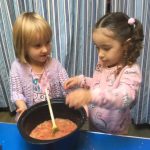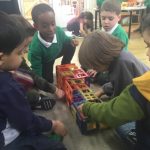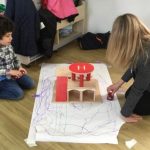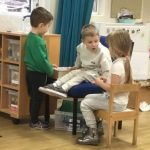I use an extensive vocabulary to add detail to my explanations and observations.
We want our children to leave by being able to:
- Use vocabulary that reflects the breadth of their experiences.
- Use subject specific vocabulary when observing, and explaining facts (vocab including positional language, times of day, mathematical language, concepts and beliefs, describe locations, celebrations, scientific, movement, feelings).
- Talk about their observations, and experiences, within both made and natural environments, using a wide vocabulary.
How will we know children can do this?
- Contribute their own ideas to Floorbooks.
- Articulate their own ‘favourite things’.
- Talk about, and answer questions, about their favourite things, using Floorbooks as a prompt.
- Articulate their dislikes appropriately.
This area of our curriculum is based upon children’s developing communication and language skills. We provide children with opportunities to experience a rich language environment, adult ratios that enable quality conversations to occur, and exciting provocations which enable children to develop their confidence and skills in expressing themselves; and to speak and listen in a range of situations.
Listening and attention
Children will learn to listen to each other and adults in a range of situations. Staff will support children to focus on things that interest them, so that their attention and concentration grows. Motivating and interesting stories, poems and rhymes will be regularly shared so that children learn to accurately anticipate key events and respond to what they hear with relevant comments, questions or actions.
Understanding
Staff will work alongside children to develop an understanding of language whilst playing, exploring and learning. They will support children to describe, explain, predict and follow instructions involving several ideas or actions. They will learn to answer ‘how’ and ‘why’ questions about their experiences and in response to stories or events.
Speaking
Children will learn to express themselves effectively, showing a growing awareness of listeners’ needs. They will have opportunities to talk about the past and present when speaking about events that have happened to them, and to think and talk about events that are happening in the future. Through role play, small world play, story-telling and discussions children will develop their own narratives and explanations by connecting ideas or events.
How can parents and carers help?
- Talking to your child, sharing experiences, remembering together, listening to them and encouraging through genuine questions do more to prepare them for school than any other activity.
- Read to your child every day!
- Repeat unusual words, or repetitive phrases in stories i.e. ‘Ginormous’ or ‘You can’t catch me!‘
- Provide a role model for your child, taking turns in a conversation, and listening to your child’s responses. We want them to be able to express themselves clearly and with confidence.
- Join in with their imaginative play, ask questions, and get them to make decisions and have opinions.
- The learning of nursery rhymes, songs and poems cannot be over emphasised and is an enjoyable and valuable activity.
- The rhymes help them to notice the sounds in words and the tunes help them to remember the words.
- Home Languages Information (52.03KB)
- Top Tips for Communication (61.07KB)
Consider where your child is on their language journey. The following video is most informative to help you understand this journey.
Lots of ideas to support language development at home can be found here:




